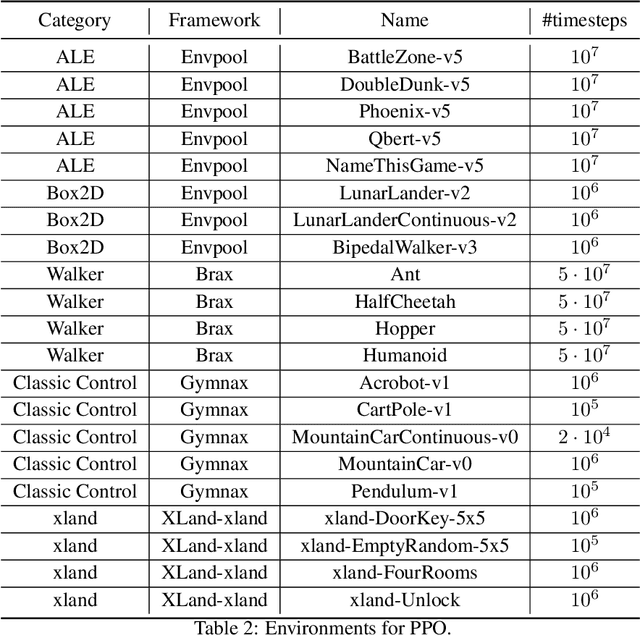Julian Dierkes
TinyverseGP: Towards a Modular Cross-domain Benchmarking Framework for Genetic Programming
Apr 14, 2025Abstract:Over the years, genetic programming (GP) has evolved, with many proposed variations, especially in how they represent a solution. Being essentially a program synthesis algorithm, it is capable of tackling multiple problem domains. Current benchmarking initiatives are fragmented, as the different representations are not compared with each other and their performance is not measured across the different domains. In this work, we propose a unified framework, dubbed TinyverseGP (inspired by tinyGP), which provides support to multiple representations and problem domains, including symbolic regression, logic synthesis and policy search.
* Accepted for presentation as a poster at the Genetic and Evolutionary Computation Conference (GECCO) and will appear in the GECCO'25 companion. GECCO'25 will be held July 14-18, 2025 in M\'alaga, Spain
ARLBench: Flexible and Efficient Benchmarking for Hyperparameter Optimization in Reinforcement Learning
Sep 27, 2024



Abstract:Hyperparameters are a critical factor in reliably training well-performing reinforcement learning (RL) agents. Unfortunately, developing and evaluating automated approaches for tuning such hyperparameters is both costly and time-consuming. As a result, such approaches are often only evaluated on a single domain or algorithm, making comparisons difficult and limiting insights into their generalizability. We propose ARLBench, a benchmark for hyperparameter optimization (HPO) in RL that allows comparisons of diverse HPO approaches while being highly efficient in evaluation. To enable research into HPO in RL, even in settings with low compute resources, we select a representative subset of HPO tasks spanning a variety of algorithm and environment combinations. This selection allows for generating a performance profile of an automated RL (AutoRL) method using only a fraction of the compute previously necessary, enabling a broader range of researchers to work on HPO in RL. With the extensive and large-scale dataset on hyperparameter landscapes that our selection is based on, ARLBench is an efficient, flexible, and future-oriented foundation for research on AutoRL. Both the benchmark and the dataset are available at https://github.com/automl/arlbench.
* Accepted at the 17th European Workshop on Reinforcement Learning
Combining Automated Optimisation of Hyperparameters and Reward Shape
Jun 26, 2024



Abstract:There has been significant progress in deep reinforcement learning (RL) in recent years. Nevertheless, finding suitable hyperparameter configurations and reward functions remains challenging even for experts, and performance heavily relies on these design choices. Also, most RL research is conducted on known benchmarks where knowledge about these choices already exists. However, novel practical applications often pose complex tasks for which no prior knowledge about good hyperparameters and reward functions is available, thus necessitating their derivation from scratch. Prior work has examined automatically tuning either hyperparameters or reward functions individually. We demonstrate empirically that an RL algorithm's hyperparameter configurations and reward function are often mutually dependent, meaning neither can be fully optimised without appropriate values for the other. We then propose a methodology for the combined optimisation of hyperparameters and the reward function. Furthermore, we include a variance penalty as an optimisation objective to improve the stability of learned policies. We conducted extensive experiments using Proximal Policy Optimisation and Soft Actor-Critic on four environments. Our results show that combined optimisation significantly improves over baseline performance in half of the environments and achieves competitive performance in the others, with only a minor increase in computational costs. This suggests that combined optimisation should be best practice.
Efficient Use of Large Pre-Trained Models for Low Resource ASR
Oct 26, 2022Abstract:Automatic speech recognition (ASR) has been established as a well-performing technique for many scenarios where lots of labeled data is available. Additionally, unsupervised representation learning recently helped to tackle tasks with limited data. Following this, hardware limitations and applications give rise to the question how to efficiently take advantage of large pretrained models and reduce their complexity for downstream tasks. In this work, we study a challenging low resource conversational telephony speech corpus from the medical domain in Vietnamese and German. We show the benefits of using unsupervised techniques beyond simple fine-tuning of large pre-trained models, discuss how to adapt them to a practical telephony task including bandwidth transfer and investigate different data conditions for pre-training and fine-tuning. We outperform the project baselines by 22% relative using pretraining techniques. Further gains of 29% can be achieved by refinements of architecture and training and 6% by adding 0.8 h of in-domain adaptation data.
 Add to Chrome
Add to Chrome Add to Firefox
Add to Firefox Add to Edge
Add to Edge